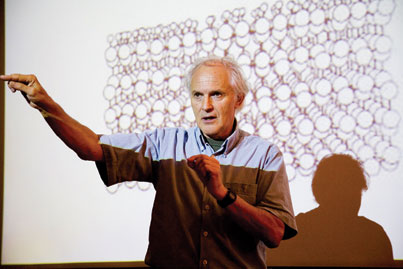Science, sustainability and the freedom to doubt
Science, sustainability and the freedom to doubt McGill University
User Tools (skip):

Sir Harold Kroto, Robert F. Curl Jr. and Richard E. Smalley won the Nobel Prize in 1996 for their discovery of fullerenes.
Claudio Calligaris
Science, sustainability and the freedom to doubt
Nobel chemist Kroto visits McGill
Sir Harold Kroto's favorite animal is the dung beetle, an insect that has evolved to eat animal excrement. "If there were no dung beetles, we'd be 80 feet deep in elephant crap!" he chuckled during a talk at McGill, part of the J.T. Donald Distinguished Lectures in Chemistry series, sponsored by the Department of Chemistry. Kroto came from the Florida State University Department of Chemistry and Biochemistry to give a lecture titled "Science, Society and Sustainability," on September 11, featuring a photograph of a field full of dumped refrigerators and a chart showing the sustainability quotients of technological instruments. The chart assigned positive or negative numbers to each item according to its environmental impact. "Where are all your old cell phones, computers, TVs?" he asked the audience. "We're going to have to start recycling things."
Technological waste is one of many problems that he believes only scientists can solve. Excessive reliance on fossil fuels, along with global warming and epidemic malaria are just a few of the issues that he touched on, giving examples of technologies he believes might solve these problems. For example, C60, a soccer-ball-shaped molecule composed entirely of carbon, could be used to increase the efficiency of solar cell manufacturing, making it possible to print them cheaply on plastic instead of silicon. With nanotube technology, a supercomputer could fit in a wristwatch.
Kroto's discovery of C60 and other molecules in the class of fullerenes earned him a Nobel Prize in Chemistry in 1996. But the overwhelming message of his lecture was not scientific; it was political, environmental and humanitarian. Kroto warned that society's pressing problems are getting worse, and that "only the scientific community understands the depth of the problems involved."
Kroto believes that science — "the only truly universal culture" — is under threat. He sees people in the public eye, from movie stars to American senators, undermining an interest in science that results in too few young people choosing to become scientists. Kroto said that only scientists are immune to the lure of blind faith: "Scientists do not believe, they check."
An example of the detrimental effects of the popular mistrust of science and technology can be found in the increase in child mortality due to malaria in countries like Uganda, thanks to an international ban on DDT. He stressed that the benefits of using the chemical in places where malaria is a serious problem would heavily outweigh the health risks, but fear prevents people from using DDT.
In order to promote the popularity of science and to make information about science and scientists more available, Kroto has set up the Vega Science Trust. The trust website (www.vega.org.uk) contains free programs, interviews and lectures, as well as teacher resources, to provide the science, engineering and technology communities with a forum to distribute information about themselves. Kroto also travels around the world to give workshops to children and is currently working on a nanotechnology initiative at Florida State University.
Sir Harold Kroto, Robert F. Curl Jr. and Richard E. Smalley won the Nobel Prize in 1996 for their discovery of fullerenes.

